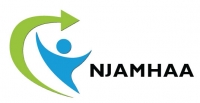NJAMHAA Promotes Mental Health Awareness for National Minority Health Month
April 4, 2017
MERCERVILLE, NJ - Last year, the Centers for Disease Control and Prevention announced that death rates for African Americans had fallen by 25% between 1999 and 2015. Earlier this year, President Donald Trump declared that unemployment for African-Americans and Hispanic Americans is at record lows. However, despite good news about increasing length and quality of life for racial minorities, distressing disparities persist, especially for mental health and substance use disorders. The Office of Minority Health, part of the U.S. Department of Health and Human Services, focuses on Partnering for Health Equity this April for National Minority Health Month.
The New Jersey Association of Mental Health and Addiction Agencies, Inc. (NJAMHAA) is a trade association representing 160 New Jersey community-based organizations providing behavioral healthcare services, which can be found in every county statewide and serve individuals of all backgrounds.
"Minority New Jersey residents are more likely to experience poverty and violence, leading to greater stress that can increase their risk for mental illnesses and substance use," said Debra L. Wentz, Ph.D., President and CEO of NJAMHAA. "Many of our member providers are located in areas with high concentrations of minority residents, and the clinicians who serve these populations themselves have diverse backgrounds. Our members are committed to helping all people who are struggling with mental illnesses, substance use disorders, and/or physical health conditions connect to services that will enable recovery."
According to the Substance Use and Mental Health Services Administration (SAMHSA): "Communities of color tend to experience greater burden of mental and substance use disorders often due to poorer access to care; inappropriate care; and higher social, environmental, and economic risk factors." Among some of the unfortunate mental health and substance use disparities that minorities face are:
- African Americans, American Indians and Alaska Natives, and Native Hawaiian and Other Pacific Islanders have higher rates of illegal drug use than the national average, according to SAMHSA.
- The suicide rate for American Indian and Alaska Native young adults is about 1.5 times the national average. This population also has significantly higher rates of co-occurring mental and substance use disorders, according to SAMHSA.
- While the overall suicide rate for children ages 5 to 11 remained stable since the mid-1990s, the rate for black children in this age group increased significantly during that time period, a 2015 study published in JAMA Pediatrics found.
- Black and Hispanic-American adults in middle age exhibited higher rates of depression than their white counterparts, but the difference was mostly related to factors like chronic disease, lack of health insurance, and lifestyle factors such as smoking and exercise, which all vary across races, according to a 2003 study published in the American Journal of Public Health.
- Asian-American adults were the least likely racial group to utilize any mental health services, SAMHSA found. The same study found that the most common reason across all racial groups for not seeking services was cost/lack of health insurance.
NJAMHAA builds relationships with state and federal legislators and regulators to advance behavioral health awareness, as well as to bridge gaps in the delivery of mental health and substance use disorder services for all populations. Additionally, NJAMHAA's charitable subsidiary, the New Jersey Mental Health Institute (NJMHI), has conducted extensive research and reported on improving mental health outcomes for the Hispanic population through its nationally and internationally recognized project, Changing Minds, Advancing Mental Health for Hispanics.
Through the work of NJAMHAA-affiliated groups and agencies, people of all races living in New Jersey have increased access to life-saving behavioral healthcare services that enable their families and communities to thrive. For National Minority Health Month, NJAMHAA encourages advocates to reach out to minority communities, to be open to conversations about mental health and substance use from varying cultural perspectives, and to encourage the breakdown of financial, social, and cultural barriers that prevent too many minority Americans from accessing behavioral healthcare services and living fulfilled lives.


